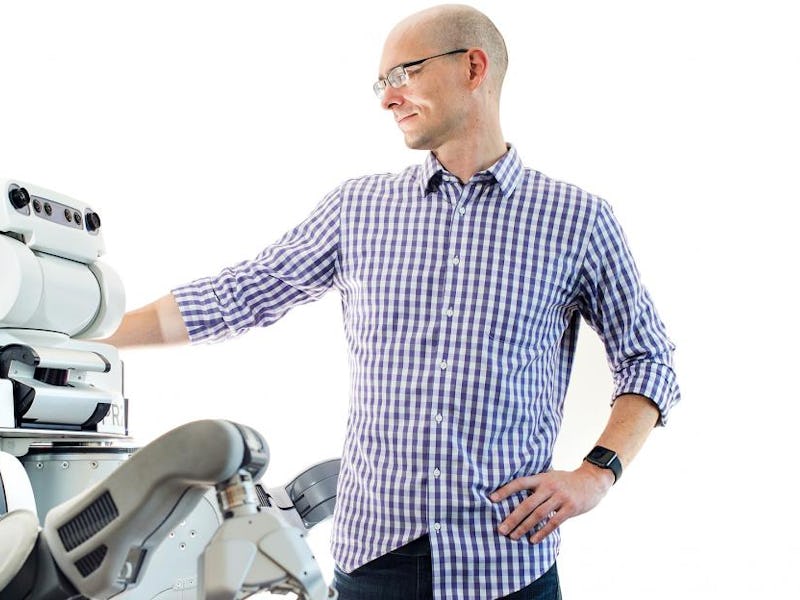Why Did a "Star" A.I. Expert Leave Elon Musk's OpenAI? A Roboticist Explains
The future could be now for robots that learn.

He may not be a household name, but Pieter Abbeel is about as big a deal as it gets in artificial intelligence — just ask his colleagues.
“Oh, he’s a star,” robotics professor Cong Wang tells Inverse. “He’s been a star since the time he was a student at Stanford, and he was a star on the job market for a faculty job. And then he became a star after he was faculty. People always talk about him and his patents.”
Abbeel has been a professor at the University of California, Berkeley since 2008, and he spent the past two years at OpenAI, Elon Musk’s A.I. research company. He recently left to found the startup Embodied Intelligence, which has received $7 million in investments and aims to develop “A.I. software that makes it easy to teach robots new, complex skills.”
The shared goal for researchers like Abbeel and Wang, who were at Berkeley together when the latter was working on his doctorate, is to create robots that don’t need to be precisely engineered to complete specific tasks. Rather, they can figure out how to accomplish assigned tasks either through trial and error or through watching and copying how a human instructor does it.
“He’s one of the pioneers working on robot learning from human demonstrations,” Wang, now a professor at the New Jersey Institute of Technology, says of Abbeel. “Each of those demonstrations is very new in the field. He’s the first person showing a robot learning how to tie a rope in the generic manner, not just recording and replaying but actually learning how the skill works to tie a rope.”
As the New York Times pointed out in a profile of Abbeel from earlier this week, he is the second big name to leave the OpenAI nonprofit to pursue a commercial application — his colleague Andrej Karpathy previously left to become director of A.I. for Tesla. This suggests machine learning is on the verge of moving from research pursuit to potential moneymaking venture. Wang is more skeptical.
“If you’re asking my opinion about him starting this company as opposed to doing research in a university, to be honest I’m not sure,” he says. “I believe robot learning is very important and it is going to change robotics in the future. However, at this point, I myself have no idea how to cash out that thing as an industry.”
While Abbeel’s work has been innovative, it’s not without its limitations. Wang points out most of his colleague’s demonstrations have to be sped up to as much as 50 times normal speed.
“The robot knows what to do, but it can only do it slowly,” he says. “If you accelerate the robot it’s going to run into motor capability problems, whereas I want to show people robots can also learn motor capability and do acrobatic stuff.”
For more on Wang’s work, check out this earlier article on his nunchuck-flipping robots.
These physical limitations are what Abbeel has referred to as hardware issues, which are explicitly not the focus of his work. His emphasis is on the software, the logic and sequences needed to improve a robot’s reasoning within its environment. Wang says this is an area where the two differ — as far as he’s concerned, robots’ simple motor skills aren’t as ready for primetime as Abbeel thinks.
But this may not matter for Embodied Intelligence, as the goal may not actually be to make a specific, practical A.I. product anytime soon. Rather, Wang says the early years of these commercial machine learning companies could just be laying the groundwork for later innovation.
“Think about telecommunications,” he says. “At the very beginning, those people were buying all the bandwidth, and nobody knew what they were doing. But it turned out that it was like discovering a new continent and securing the ownership of the land, of the whole continent.”
Wang pointed out Google’s A.I. subsidiary DeepMind made zero profit last year, yet Google must see good reason in a long-term, multi-million investment. The same goes for Honda, which has invested in the development of the humanoid robot Asimo since the 1980s still with little direct profit to show for it.
What exactly the plan is for the $7 million investment in Embodied Intelligence remains unclear, but Wang says he’s optimistic Abbeel and his colleagues are working on something worth all that money.
“Pieter doesn’t waste money,” says Wang. “That I’m sure about. But I’m curious.”
If you liked this article, check out this video of Elon Musk’s unbeatable A.I. bot in DOTA 2.